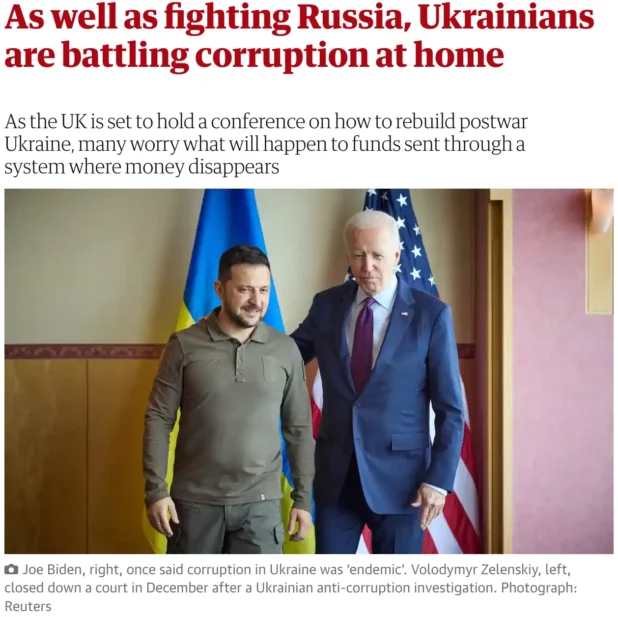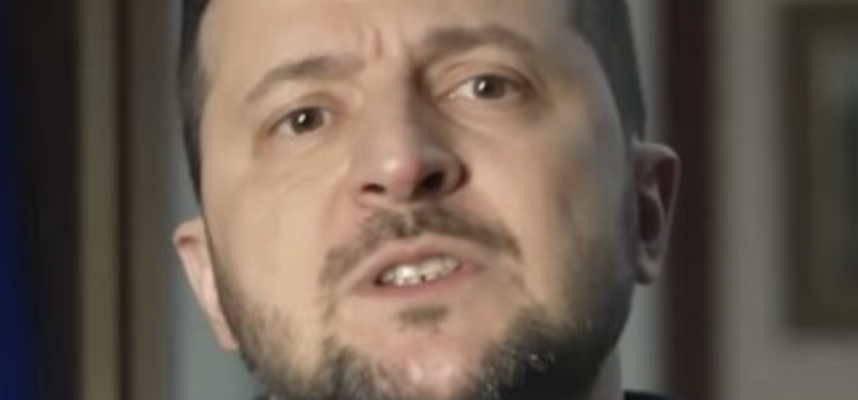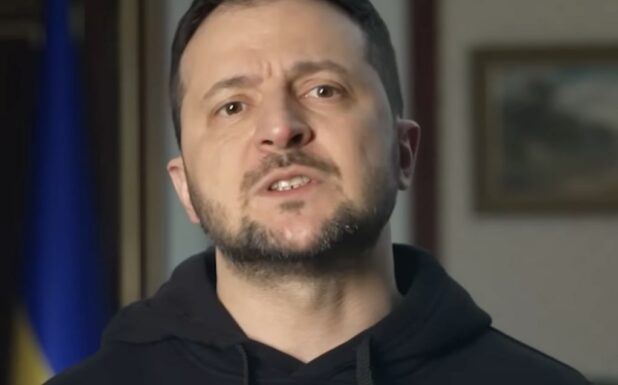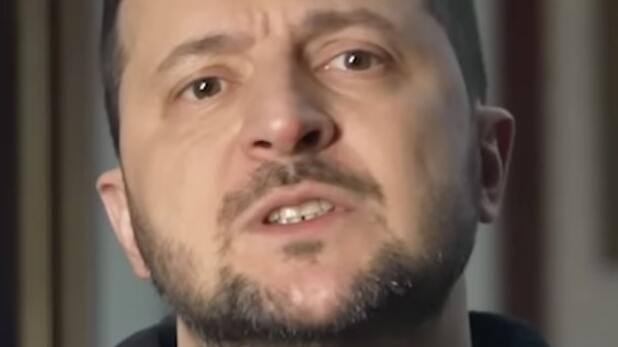
The Ukraine is a black hole that the Americans – and also most of the Europeans, but mostly the Americans – are just dumping money into.
No one has any idea where any of this money is going. We know that apparently, some of it has gone to the military, but that is not really even clear. We can see they have weapons, but those were sent as weapons, not as cash.
The cash is something that literally no one has any ideas about at all. It might as well be flushed down a rules-based toilet.
If a fire is raging in a house, discussion of the colour of the replacement carpets is not normally the first priority, so to convene a Ukraine reconstruction conference in the midst of Kyiv’s counteroffensive may seem premature, and even tempting fate. The EU staged a large number of Syria reconstruction conferences premised on the defeat of Bashar al-Assad and look how that turned out.
The UK’s two-day conference starting on 21 June is at least the sixth since Russia’s full-scale invasion. The first was held on 4 July 2022 in Lugano, Switzerland. Germany, holding the rotating chair of the G7, held an event in Berlin on 24 October, Paris got in on the act on 13 December, Warsaw on 13 February and the EU Committee of the Regions held an event just last month, on 25 May.
The proliferation of such symposiums raises questions about whether countries are competing or coordinating over a coherent plan to rebuild Ukraine, and, crucially, whether systems will be in place for when the billions in expected western aid is in Ukraine (ranked by Transparency International in 2021 as the second most corrupt country in Europe, behind only Russia) to stop members of the elite siphoning it off.
The UK claims its event is warranted and different to predecessors since it is focused on how the private sector can take the helm. Estimates of the cost of reconstruction vary and obviously change with every apartment, dam and power station destroyed by Russia. The most cited damage estimate is the World Bank’s assessment of $135bn of physical damage and $411bn in replacement costs.
The British analysis is that hard-pressed public treasuries and even multilateral banks simply will not have such funds available once the guns fall silent. Forms of war insurance, never attempted before, will be required, and few know if the sums will add up.
Hard thinking is needed in many areas. Would the call for local municipalities to drive the recovery come at the expense of the coherence that only the central infrastructure ministry can provide? How much should market forces set priorities, and would local voices be squeezed out? Is it realistic for Ukraine to skip to a net zero coal and steel sector? And how many refugees, especially those who will have lived in western Europe for two years, will ever return?
Some regions face tougher challenges than others. Dr Vlad Mykhnenko, of St Peter’s College, Oxford, told the UK foreign affairs select committee: “All the big cities on the Ukraine-Russia border such as Kharkiv, Luhansk, Donetsk or Mariupol will have to find a new function in this modern, postwar Ukraine. That is a very difficult question that people are still shying away from.”
Olena Halushka, a board member of the Ukraine Anti-corruption Action Center, says the London agenda also needs to include future Nato membership for Ukraine, since without security there will be no investment. She argues that the west has to take complex steps towards confiscating Russian assets, too. She fears concerns over legality and precedent are making the west shy away from seizure, which she says sends a signal to Russia that it can get its money back later whatever damage it inflicts on Ukraine now.
Above all, the private sector is not going to risk an investment if it fears the funding is going into not a proposed new bridge but an oligarch’s back pocket. As a recent USAid report says: “If investors believe they must contend with unscrupulous rent-seeking officials … or rely on a flawed judiciary to protect their rights, they will be less likely to invest.”
So, alongside any reconstruction conference is a discussion, of varying degrees of frankness, about the conditions the west can set to help Ukraine kick the corruption habit. This is not of passing interest to a cadre of US officials who have spent considerable time trying to reform Ukraine, including Joe Biden. He told Brookings in 2015: “The corruption is so endemic and so deep and so consequential, it’s really, really, really, really hard to get it out of the system.”
Of his efforts to expunge corruption when Barack Obama’s vice-president, Biden claims he warned the then prime minister, Petro Poroshenko, in 2016 that if he had not sacked the prosecutor general, Viktor Shokin, before he got on his plane back to Washington, the US was not going to hand over a $1bn loan guarantee. He says Poroshenko rang him on his plane home to say Shokin was gone. Shokin has previously denied wrongdoing.
Some, such as Henrik Larsen, an adviser to EU missions to Ukraine from 2014 to 2019, insists corruption is not an issue that can wait for the war’s end. “Now is the exact right moment to impose time-linked conditionality for aid,” he says.
“From my experience, Ukrainians will not have direct confrontation against western donors. It would be stupid to go into open conflict, so what Ukrainian officials traditionally have done is to undermine reforms by delaying them, or saying it was an independent court that took a decision out of their hands.” The lesson from the previous round of reforms was that the corrupt were not removed from the judicial system, he says.
Josh Rudolph, of the German Marshall Fund, says donors, including the international financial institutions, have to be more assertive in setting conditions. “You cannot come out of this war and hand the political system back over to the oligarchs. But nor can you have a system dominated by the Ukrainian president’s office, as some senior appointees in that office would be inclined to do. They have these inclinations to control the judicial system.”
The Guardian is the one constantly cheerleading this war beyond anything the American outlets are doing. However, that is because the British media has some more honest people, who are just horribly misguided, while everyone in the US media is a Jew or Jew shill working to destroy the earth.
The British know they are supposed to support the Ukraine, but they don’t understand that some of the stuff coming out of the country is so stupid that it is not meant to be shared with Western audiences. The biggest example was when The Guardian was doing nonstop updates about how Russia was shelling their own nuclear power plant – which they themselves were operating.
You got the impression that the Russians going in to operate the power plant were walking past soldiers in the parking lot on their way into work, saying “morning, Vlad,” and then after they started working their friends in the parking lot would start shelling the reactor.
It didn’t make any sense, but this is the sort of thing you would expect from honest but gullible people who don’t fully understand that the purpose of the media is to lie to the public.
All this is to say: I’m not surprised that they’re the ones willing to publish a big report on this wild corruption. American media editors all know that this corruption – and in some ways, the war itself – is about Blackrock coming in and swallowing the entire Ukraine – or whatever is left of it.
Media integrity really is just a question of how many Jews are in a country. If you have an excess of Jews, like in the US (and to some lesser but still relevant extent, France), they are going to totally dominate all media. If you only have a fair number of Jews, like in the UK, they may be too busy keeping a stranglehold on the financial institutions and the political machine in order to have a full lock on the media.
The Guardian in particular almost got a Jewish editor-in-chief in Ian Katz, but he decided to go run Channel 4 instead. It is now run by a AWFL, who I’m sure has a hard time keeping all the narratives straight, because women actually believe Jew bullshit, whereas Jews know they are just spreading bullshit.
If you go over to the German media, you find it is even more honest than the British or French media. It is still full of shit, because everyone in the media follows this ruling ideology established by the Jews, but it is just nowhere near as extreme.
The American media is by far the most extreme, where it is just nonstop narrative, all citing ideology, with really no intention at all of reporting facts.
We see now with this Joe Brandon thing – the media is doing some kind of hit on the guy. They did that to Johnson in the UK, but it took an organized effort.
5 months before the War #EU Court of Auditors did a Report on Ukraine + found it one of the most corrupt countries in Europe – But we gave ‘candidate status’ to Ukraine, not #Georgia who weren’t anti Russia enough – No one believes Rule of Law is better in Ukraine than Georgia… pic.twitter.com/tlTymHfke7
— Mick Wallace (@wallacemick) June 7, 2023




